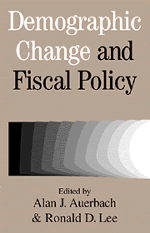Book contents
- Frontmatter
- Contents
- List of Figures
- List of Tables
- Contributors
- Acknowledgments
- 1 Introduction
- 2 Population Forecasting for Fiscal Planning: Issues and Innovations
- 2-1 Comment
- 2-2 Comment
- 3 Uncertainty and the Design of Long-Run Fiscal Policy
- 3-1 Comment
- 3-2 Comment
- 4 How Does a Community's Demographic Composition Alter Its Fiscal Burdens?
- 4-1 Comment
- 4-2 Comment
- 5 Social Security, Retirement Incentives, and Retirement Behavior: An International Perspective
- 5-1 Comment
- 5-2 Comment
- 6 Aging, Fiscal Policy, and Social Insurance: A European Perspective
- 6-1 Comment
- 6-2 Comment
- 7 Demographics and Medical Care Spending: Standard and Nonstandard Effects
- 7-1 Comment
- 8 Projecting Social Security's Finances and Its Treatment of Postwar Americans
- 8-1 Comment
- 9 Demographic Change and Public Assistance Expenditures
- 9-1 Comment
- 9-2 Comment
- Index
4 - How Does a Community's Demographic Composition Alter Its Fiscal Burdens?
Published online by Cambridge University Press: 03 February 2010
- Frontmatter
- Contents
- List of Figures
- List of Tables
- Contributors
- Acknowledgments
- 1 Introduction
- 2 Population Forecasting for Fiscal Planning: Issues and Innovations
- 2-1 Comment
- 2-2 Comment
- 3 Uncertainty and the Design of Long-Run Fiscal Policy
- 3-1 Comment
- 3-2 Comment
- 4 How Does a Community's Demographic Composition Alter Its Fiscal Burdens?
- 4-1 Comment
- 4-2 Comment
- 5 Social Security, Retirement Incentives, and Retirement Behavior: An International Perspective
- 5-1 Comment
- 5-2 Comment
- 6 Aging, Fiscal Policy, and Social Insurance: A European Perspective
- 6-1 Comment
- 6-2 Comment
- 7 Demographics and Medical Care Spending: Standard and Nonstandard Effects
- 7-1 Comment
- 8 Projecting Social Security's Finances and Its Treatment of Postwar Americans
- 8-1 Comment
- 9 Demographic Change and Public Assistance Expenditures
- 9-1 Comment
- 9-2 Comment
- Index
Summary
Introduction
With local communities providing such diverse services as education, public safety, infrastructure, and public health care, the demographic characteristics of a locality's population (e.g., age composition) surely play a fundamental role in determining both a community's fiscal needs and its fiscal capacity. Furthermore, a community's ability to efficiently fund services through the rents individuals derive from them is sharply curtailed by a variety of critical intercommunity spillovers that lead to benefits being enjoyed outside the jurisdiction of the community. These spillovers not only arise from the familiar routes associated with public goods being consumed by nonresidents, but also come into play for community investments in people who leave jurisdictions before realizing returns from such investments. The presence of these intercommunity spillovers constitutes a primary force generating what we call “fiscal burdens”, which govern the fiscal federalism that relates policies of local and central governments. Throughout, we will define the fiscal burden of a local government as the excess of its expenditures valued by “outsiders” over the tax revenues it receives from them. This chapter investigates the relatively unexplored questions of the extent to which a community's age composition impacts its fiscal burden and the extent to which intergovernmental transfers from central governments can and do compensate the localities for these burdens.
- Type
- Chapter
- Information
- Demographic Change and Fiscal Policy , pp. 101 - 148Publisher: Cambridge University PressPrint publication year: 2001
- 5
- Cited by



